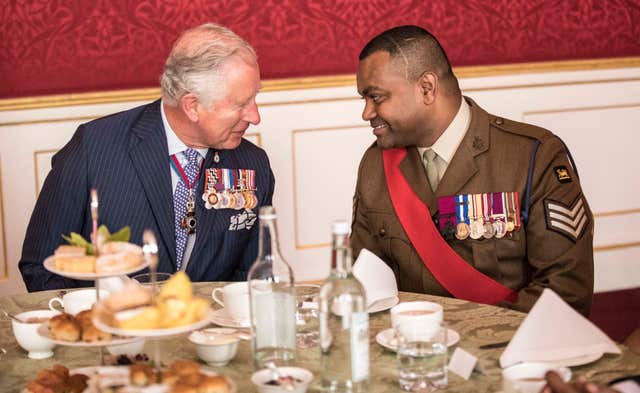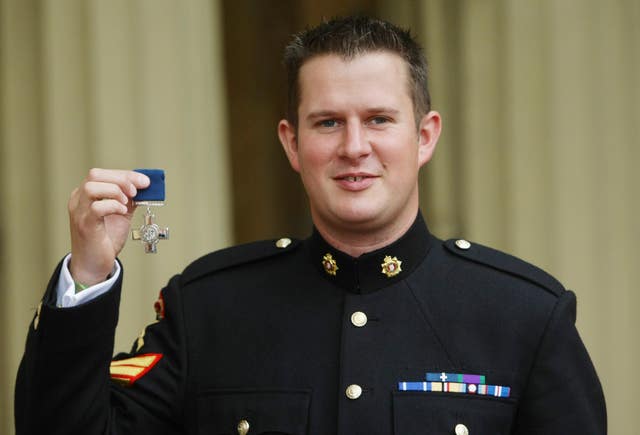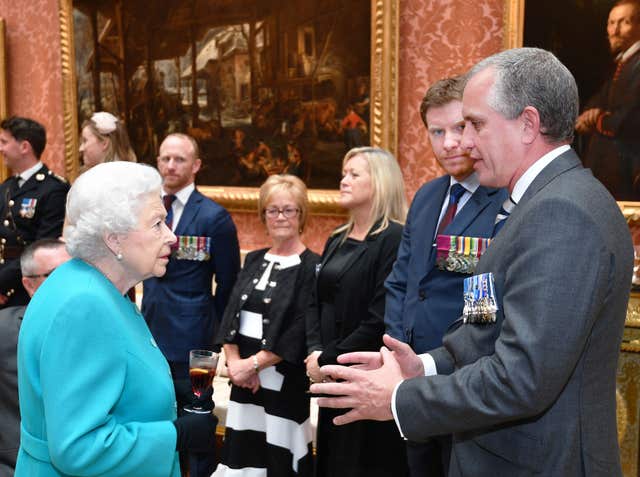Queen’s funeral guest list includes Victoria and George Cross recipients
The Victoria Cross and George Cross Association said 17 of the 23 recipients will be at the service on Monday.

Seven Victoria Cross and 10 George Cross medal recipients will be at the Queen’s funeral service on Monday, including one from New Zealand and four from Australia.
Here is a list of them, and their achievements:
– Willie Apiata VC (for New Zealand)
In 2004, Lance Corporal Apiata , who was part of a New Zealand Special Air Service troop on patrol in Afghanistan, saved the life of a colleague by bravely taking him to an area where he could receive medical attention.
This involved carrying him across 70m of broken and rocky ground under heavy enemy fire and return fire.
– Jim Beaton GC CVO
In 1974, while working as Princess Anne’s personal police officer, Inspector Beaton shielded the Princess Royal from a gunman, putting his own life in danger.
The Princess Royal and Captain Mark Phillips were returning by car to Buckingham Palace from an official engagement when they were ambushed by the gunman. Inspector Beaton was repeatedly wounded in the attack.
– CSgt Johnson Beharry VC

Colour Sergeant Johnson Beharry VC was awarded Britain’s highest military honour for twice saving colleagues while under fire in Iraq.
With no regard for his personal safety, and while under heavy fire, he personally carried wounded colleagues to safety and manoeuvred vehicles to positions where they were less likely to be under attack.
– Matt Croucher GC
Lance Corporal Croucher showed immense bravery during deployment to Helmand Province, Afghanistan, in 2007 and 2008.
He threw himself on a grenade at one point to save the lives of fellow marines, pinning the grenade under his day sack. As it detonated, the blast effect of the grenade was absorbed by Lance Corporal Croucher and the majority of the fragmentation was contained under his body.
– Cpl Mark Donaldson VC (for Australia)
Trooper Mark Donaldson showed disregard for his personal safety in Afghanistan in 2008 as he sought to protect his colleagues.
During one early stage of the enemy ambush, he deliberately exposed himself to enemy fire in order to draw attention to himself and thus away from wounded soldiers.
– Chris Finney GC
Trooper Finney rescued an injured colleague in 2003 while under attack just north of Basra, Iraq, and sought to rescue another colleague.
Despite his own wounds and the continuing danger from exploding ammunition, Trooper Finney was also able to reach a vehicle and radio for help.
– Tony Gledhill GC
In 1966, Constable Gledhill and a colleague pursued a car that was speeding on the wrong side of the road through the streets of south London.
At least 15 shots were fired at the police car by the occupants of the vehicle, using a sawn-off shotgun and revolvers. Constable Gledhill was involved in a struggle with one of the armed occupants once the car stopped, and risked his life to ensure the gunman was captured.
– Kevin Haberfield GC
Royal marine Kevin Haberfield received the George Cross for action in Afghanistan in 2005. No further details have been released.
– Warrant Officer Class 1 Kim Hughes GC

In 2009, Staff Sergeant Hughes was working in Afghanistan when several comrades were injured or killed by explosive devices.
He set about clearing a path to the injured, providing constant reassurance that help was on its way, and also calmly carried out manual neutralisation of three explosive devices – the single most outstanding act of explosive ordnance disposal ever recorded in Afghanistan.
– Daniel Keighran VC – 6th Battalion
In 2010, while under sustained enemy fire in Afghanistan, Corporal Keighran identified enemy locations and was able to help direct the return fire of both Australian and Afghan machine guns.
Disregarding his own safety, Corporal Keighran deliberately and repeatedly drew enemy fire towards himself so that targets could be identified by machine gunners.
– Cpl Josh Leakey VC
Lance Corporal Leakey was deployed in Afghanistan in 2013 when he led a casualty evacuation.
He also risked his life under enemy fire to get suppressed machine guns into action, enabling troops to regain the initiative against enemy forces.
– Major Pete Norton GC
In 2005, while on deployment near Baghdad, Major Norton ensured the safety of coalition forces after a huge explosion with improvised explosive devices caused the death of four US personnel.
He also personally risked his life to see whether a command wire improvised explosive device was present. An explosion meant he suffered an amputation of his left leg and serious blast and fragmentation injuries to his right leg, arms and lower abdomen. Despite his own injuries, he calmly directed his colleagues to safety.
– Keith Payne VC AM DSC (for Australia)
In May 1969, Warrant Officer Payne and the battalion he was commanding came under attack by a superior strength force of North Vietnamese in Kontum Province. He temporarily held off the assaults by firing his weapon and collecting grenades to throw at the attackers, suffering wounds to the hand and arms.
As indigenous soldiers in his company fell back, he ran across open ground under fire to stop their retreat and organise them into a defensive position before, after darkness had fallen, venturing out by himself to find wounded and other indigenous soldiers, rounding up 40 lost soldiers and assisting an American adviser to return to his battalion’s base.
– Michael Pratt GC
Police constable Pratt was off duty and unarmed when he drove past a bank that was being held up by three masked and armed men in June 1976. He turned his car around, drove on to the pavement and blocked the bank’s entrance before urging a bystander to call police.
As the gunmen threatened him to move the car and then attempted to leave the bank, Constable Pratt, then armed with the handle of a car jack, grabbed one of the robbers and knocked him unconscious. As that man came to and got to his feet, Constable Pratt grabbed him once more before a second gunman shot him at close range, seriously wounding him.
– Ben Roberts-Smith VC MG (for Australia)
As a patrol second-in-command assigned to the Special Operations Task Group on Operation Slipper in Afghanistan, Corporal Roberts-Smith assaulted a fortification with three enemy machine gun positions and superior numbers of heavily armed insurgents.
With members of his patrol pinned down, he deliberately drew fire away from his team, allowing them to fire back, before he stormed two enemy positions and killed both machine gun teams.

– Captain Sam Shephard GC
During a diving exercise in Egypt in August 2013, then Lieutenant Shephard (Royal Marines) had been snorkelling 200m off shore with five others when a fellow diver, who was also his friend, suffered an embolism and sank quickly to a depth of 40m. Lt Shephard attempted a rescue without air or equipment, before his dive instructor arrived and judged it too dark, deep and dangerous to continue.
Lt Shephard disregarded the advice and, with his equipment, dived to a depth of up to 60m with poor visibility in the fading light – far beyond his training. He found his friend on a reef, suffered deep cuts to his legs as he fought to free him and then returned to the surface with the casualty, who did not survive.
– Dominic Troulan GC QGM
In 2013, a group of heavily-armed terrorists entered the Westgate Shopping Mall in Nairobi, Kenya, and started to murder men, women and children.
Dominic Troulan, a security consultant working in Nairobi, was contacted by a friend who asked him to go to the mall to try to locate his wife and daughter.
Mr Troulan managed to find the women and bring them to safety, but then went back at least 12 times to bring other innocent people out of the building.
Armed only with a pistol, he was fired on twice by the terrorists but managed to force them back.





